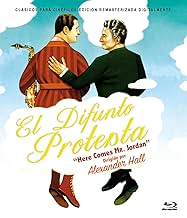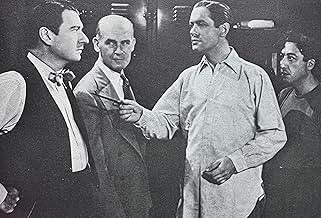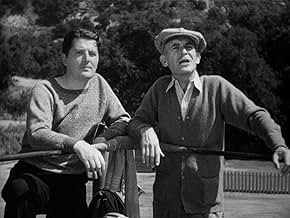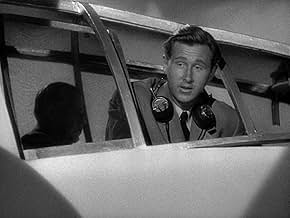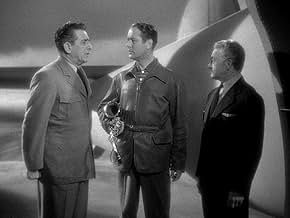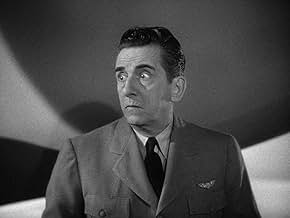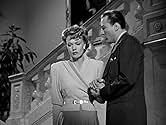Ajouter une intrigue dans votre langueBoxer Joe Pendleton dies 50 years too soon due to a heavenly mistake and is given a new life as a millionaire playboy.Boxer Joe Pendleton dies 50 years too soon due to a heavenly mistake and is given a new life as a millionaire playboy.Boxer Joe Pendleton dies 50 years too soon due to a heavenly mistake and is given a new life as a millionaire playboy.
- Réalisation
- Scénario
- Casting principal
- Récompensé par 2 Oscars
- 8 victoires et 6 nominations au total
Warren Ashe
- Charlie
- (non crédité)
Carlyle Blackwell Jr.
- Boxing Match Spectator
- (non crédité)
Lloyd Bridges
- Sloan - Plane #22 Co-pilot
- (non crédité)
Morgan Brown
- Man at Missing Persons Bureau
- (non crédité)
Eddie Bruce
- Reporter
- (non crédité)
James Carlisle
- Board Member
- (non crédité)
Ken Christy
- Chuck - Plainclothesman
- (non crédité)
Avis à la une
Boxer Joe Pendleton is days away from his championship bout when his private plane goes down and the agents of death take him away to heaven. Unfortunately for Joe, the agent acted too fast and, had he waited he would have seen Joe recover the crashing aircraft and make it away safely. Problem is in the time taken to sort this out (which has involved top agent Mr Jordan), Joe's earthly remains have been cremated with no chance of him just being returned to his body. So begins a search for another body for Joe, a search that ultimately leads to millionaire Farnsworth who has just been murdered by his wife and her lover.
Looking at the basic plot (and even the detail of the ending) it does strike me as rather amazing that this did get made as a studio picture because it does have a dark streak to it that could easily have undercut any comedy, whimsy or romance and alienated the audience. Watching it again recently it does still surprise me that it pulls it off but somehow it is light, funny and with plenty of charm and somehow even the rather ambiguous ending comes off as lifting and happy. A big part of this for me is the cast because they get the delivery just right in particular Robert Montgomery. Some have said that Rains dominates his scenes but I totally disagree, Montgomery owns the film because the tough but kind nature of his character is the engine that drives it to success. He is note perfect and his performance kept me with the tone of the film. Rains is nearly as good but is more of a cool presence in each scene.
Hall's direction holds it together and makes the tone so that we never lose the slight hint of darkness but prevents it ever getting in the way of the comedy and fantasy of the piece. Here Comes Mr Jordan has been remade several times recently and you can see why because this original is charming and fresh with solid comedy and whimsy held together by a couple of great performances.
Looking at the basic plot (and even the detail of the ending) it does strike me as rather amazing that this did get made as a studio picture because it does have a dark streak to it that could easily have undercut any comedy, whimsy or romance and alienated the audience. Watching it again recently it does still surprise me that it pulls it off but somehow it is light, funny and with plenty of charm and somehow even the rather ambiguous ending comes off as lifting and happy. A big part of this for me is the cast because they get the delivery just right in particular Robert Montgomery. Some have said that Rains dominates his scenes but I totally disagree, Montgomery owns the film because the tough but kind nature of his character is the engine that drives it to success. He is note perfect and his performance kept me with the tone of the film. Rains is nearly as good but is more of a cool presence in each scene.
Hall's direction holds it together and makes the tone so that we never lose the slight hint of darkness but prevents it ever getting in the way of the comedy and fantasy of the piece. Here Comes Mr Jordan has been remade several times recently and you can see why because this original is charming and fresh with solid comedy and whimsy held together by a couple of great performances.
This movie is my favorite film because of the comic and dramatic acting. Robert Montgomery is able to switch between Farnsworth and Joe Pendelton in a split second When he switches to Murdoch, you have a slight difference in speech and walk between Murdoch and Joe. The James Gleason scene in the gym with Montgomery is perfection. I love Claude Rains facial expressions and Edward Everett Horton's bumbling. The dectective's line (I believe he is William McBride, a great comic actor of the 1940's), "Where's the body" is one that I use as a joke with my husband often. The remakes of this film don't come close to the original. "Down to Earth", the one with Chris Rock, was just terrible. This plot has been borrowed often. It is the first film that every dealt with this subject and will remain a classic forever.
Boxer Joe Pendleton is killed in an airplane crash, while training for a championship match, however Joe wasn't to die for sometime far into the future. In order to make things right, Mr. Jordan (in charge of all arrivals for the hereafter) searches for another body that Joe can use until his time is up. The body of financier Bruce Farnsworth is the selection after he is killed by his wife and secretary in order to continue their romance and get ahold of his finances. Betty Logan appears to get Farnsworth to settle the matter concerning her father, who was sent to prison in a deal swindled by Farnsworth, and Joe frees her father, but falls for her as well. In the meantime, Joe (as Farnsworth- everyone sees Joe as Farnsworth but Joe sees himself as his true being-) starts training for the championship fight (it was Joe's natural destiny to become champ), with the help of Joe's trainer, Max Corkle. This upsets Julia Farnsworth, who then decides to make certain that Joe/Farnsworth is killed. Joe and Mr. Jordan work to make sure Joe can find another body in order to become boxing champ, bring Julia and Abbott to justice, and keep the romance alive between Joe & Betty. This film has such a beautiful charm (even though it seems hokey at times, but it has the ability to bridge gaps between audiences easily. An excellent script, crisp direction, and excellent performances by the cast (Gleason standing out as the befuddled trainer Corkle.) The ending is both brilliant and touching. Rating, 9.
"Here Comes Mr. Jordan" stars Robert Montgomery as Joe Pendleton, a prize fighter who, hurtling toward earth in his damaged plane, is taken to heaven prematurely by a new heavenly worker (Edward Everett Horton).
Upon reaching the gates, it appears that the book states that Joe isn't scheduled to head skyward until 1991. An attempt to return his spirit to his body fails since Joe was cremated; Joe ends up in the body of a business tycoon, Farnsworth, just drowned by his wife and male secretary, except Farnsworth is suddenly not dead.
Joe as Farnsworth meets Bette (Evelyn Keyes) and falls in love with her while wreaking havoc with the man's money and business and continuing to aggravate his wife and secretary. Then Mr. Jordan comes to him with some really bad news.
This is a delightful movie, and though "Heaven Can Wait," its '70s remake, was very enjoyable, how could it be as good or better when Claude Rains and Robert Montgomery are in the original?
Montgomery, who for years did light comedy as an elegant leading man, is wonderful as a streetwise prizefighter. James Gleason, as Joe's manager Corkle, has some great comic moments when he meets up with Farnsworth and Farnsworth claims to be the dead Joe.
Evelyn Keyes is lovely in the ingénue role, and Rita Johnson makes an excellent murderous wife. Claude Rains played the devil in another film, and as Mr. Jordan apparently works with the Head Honcho on the other side. He exudes warmth and calmness and performs beautifully opposite the more volatile Montgomery characters.
This film was released before Pearl Harbor, but everyone knew the U. S. would be entering the war. Thus began a spate of these films - "A Guy Named Joe," "Heaven Can Wait," "The Bishop's Wife," "Angel on my Shoulder," "It's a Wonderful Life," "Down to Earth," and others.
The fascination with death, angels, destiny, and souls was understandably rampant as reflected by Hollywood from 1941-1948 as people sought to understand what happened to their loved ones.
"Here Comes Mr. Jordan" is one of the really fine examples of this genre, with beautiful performances and story. I shed some tears at the end. Perhaps you will too.
Upon reaching the gates, it appears that the book states that Joe isn't scheduled to head skyward until 1991. An attempt to return his spirit to his body fails since Joe was cremated; Joe ends up in the body of a business tycoon, Farnsworth, just drowned by his wife and male secretary, except Farnsworth is suddenly not dead.
Joe as Farnsworth meets Bette (Evelyn Keyes) and falls in love with her while wreaking havoc with the man's money and business and continuing to aggravate his wife and secretary. Then Mr. Jordan comes to him with some really bad news.
This is a delightful movie, and though "Heaven Can Wait," its '70s remake, was very enjoyable, how could it be as good or better when Claude Rains and Robert Montgomery are in the original?
Montgomery, who for years did light comedy as an elegant leading man, is wonderful as a streetwise prizefighter. James Gleason, as Joe's manager Corkle, has some great comic moments when he meets up with Farnsworth and Farnsworth claims to be the dead Joe.
Evelyn Keyes is lovely in the ingénue role, and Rita Johnson makes an excellent murderous wife. Claude Rains played the devil in another film, and as Mr. Jordan apparently works with the Head Honcho on the other side. He exudes warmth and calmness and performs beautifully opposite the more volatile Montgomery characters.
This film was released before Pearl Harbor, but everyone knew the U. S. would be entering the war. Thus began a spate of these films - "A Guy Named Joe," "Heaven Can Wait," "The Bishop's Wife," "Angel on my Shoulder," "It's a Wonderful Life," "Down to Earth," and others.
The fascination with death, angels, destiny, and souls was understandably rampant as reflected by Hollywood from 1941-1948 as people sought to understand what happened to their loved ones.
"Here Comes Mr. Jordan" is one of the really fine examples of this genre, with beautiful performances and story. I shed some tears at the end. Perhaps you will too.
10jotix100
Hollywood would probably be better off in looking to its past than at its future. The late 30s and early 40s produced a string of films that will not be equaled, or surpassed in a very foreseeable future.
Take this film. It has been re-adapted a couple of times and sadly to say, those new movies pale in comparison. There are no stars with the caliber of a Robert Montgomery, Claude Rains, Edward Everett Horton, or Evelyn Keyes, actually, or in the horizon. To get actors of this caliber in a film today, would be a monumental task to accomplish.
This film, an adaptation of a stage work, translates to the screen with such ease that is hard to surpass. Directed by Alexander Hall, with panache, is a pleasure to sit through it and enjoy.
The cast is absolutely flawless. The great Robert Montgomery is very charming in his triple 're-incarnation'. Claude Rains is perfect, as is Edward Everett Horton as heavenly figures on earth. Evelyn Keyes is so beautiful. How about Rita Johnson? She cuts such a sophisticated figure. John Emery is oily enough as the evil secretary Abbott. And James Gleason's appearance has the right amount of know how and bewilderment in understanding the situation.
This picture makes us realize how ahead of her time the brilliant Edith Head was. Her costumes are a perfect touch to enhance the appearance of the stars of that era. Wow! What style and sophistication she had! No one can come close to her.
This is an original to be savored by discerning film aficionados.
Take this film. It has been re-adapted a couple of times and sadly to say, those new movies pale in comparison. There are no stars with the caliber of a Robert Montgomery, Claude Rains, Edward Everett Horton, or Evelyn Keyes, actually, or in the horizon. To get actors of this caliber in a film today, would be a monumental task to accomplish.
This film, an adaptation of a stage work, translates to the screen with such ease that is hard to surpass. Directed by Alexander Hall, with panache, is a pleasure to sit through it and enjoy.
The cast is absolutely flawless. The great Robert Montgomery is very charming in his triple 're-incarnation'. Claude Rains is perfect, as is Edward Everett Horton as heavenly figures on earth. Evelyn Keyes is so beautiful. How about Rita Johnson? She cuts such a sophisticated figure. John Emery is oily enough as the evil secretary Abbott. And James Gleason's appearance has the right amount of know how and bewilderment in understanding the situation.
This picture makes us realize how ahead of her time the brilliant Edith Head was. Her costumes are a perfect touch to enhance the appearance of the stars of that era. Wow! What style and sophistication she had! No one can come close to her.
This is an original to be savored by discerning film aficionados.
Le saviez-vous
- AnecdotesColumbia chief Harry Cohn had serious misgivings about this adaptation of Harry Segall's minor stage play. He preferred to reserve his more lavish budgets for surefire successes (e.g., anything featuring the studio's biggest star, Rita Hayworth). However, Sidney Buchman eventually was able to talk Cohn into forking out for costly celestial sets and Farnsworth's elaborate mansion and also into hiring Robert Montgomery on loan-out from MGM. Buchman was also able to convince Cohn that he had a better appreciation of what the public would pay to see than the Wall Street bankers to whom Cohn answered.
- GaffesJust before Joe Pendleton and the messenger arrive at Joe's apartment, looking for his body, they pass a woman coming from the other direction. She moves her shoulder back and to the left to let Joe pass and also steals a quick glance at him. According to the messenger's comments just a moment later, neither he nor Joe can be seen or heard, so the woman should not have moved to let them pass or noticed them at all.
- Citations
[last lines]
Mr. Jordan: So long, champ.
- ConnexionsFeatured in Sports on the Silver Screen (1997)
- Bandes originalesThe Last Rose of Summer
(1808) (uncredited)
Music: traditional Irish melodies
Played often on saxophone by Robert Montgomery (probably dubbed)
Played also in the score
Meilleurs choix
Connectez-vous pour évaluer et suivre la liste de favoris afin de recevoir des recommandations personnalisées
- How long is Here Comes Mr. Jordan?Alimenté par Alexa
Détails
- Durée1 heure 34 minutes
- Couleur
- Rapport de forme
- 1.37 : 1
Contribuer à cette page
Suggérer une modification ou ajouter du contenu manquant

Lacune principale
By what name was Le défunt récalcitrant (1941) officially released in India in English?
Répondre

